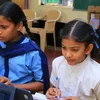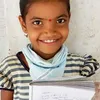Enabling higher RT-PCR tests to distributing ration – Citibank’s pandemic relief efforts for the underserved
This week on Beyond The Business, we explore how Citibank came up with a unique initiative to help the government in its fight against the pandemic.
Krishnan from Chennai made his living by ironing clothes. A livelihood that brought him sufficient income, but one that came to a complete and sudden standstill when the coronavirus outbreak unleashed fears over hygiene and safety. As people stopped sending him clothes for ironing, his business was severely affected.
Meanwhile, Mumbai-based Vishnu Jha, a watchman by profession, was planning to head back home for his holidays after 2.5 years. However, due to the travel restrictions that were in place, he was not able to go.
But Krishnan and Vishnu did not have to struggle for long, as hope came in the form of an initiative that was aimed at uplifting the most impacted communities during the pandemic.
‘Coming Together,’ a CSR initiative by Citibank, came to the rescue of many severely impacted individuals, and just in time too, as the coronavirus ravaged on. Debasis Ghosh, Head of Global Public Affairs, Citi, South Asia, says that the initiative was targeted at supporting government efforts in the pandemic war.
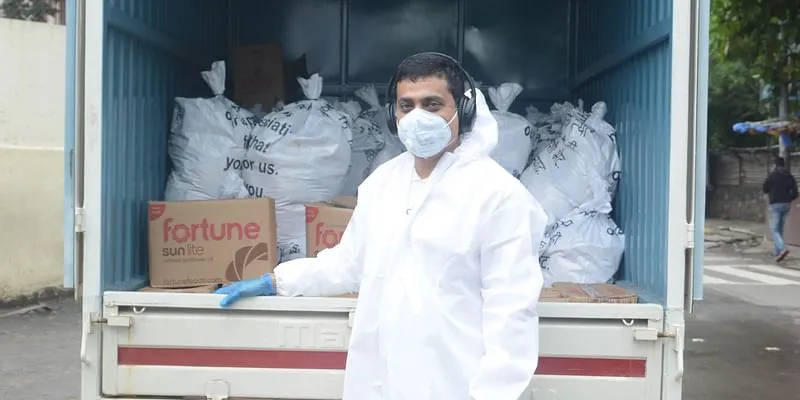
Debasis Ghosh with the ration kits that were to be distributed as a part of the 'You Nominate. We Donate.' initiative.
“Coming Together consisted of five pragmatic solutions - two newly created unprecedented programmes in public health and food security – ‘Ummeed’ and ‘You Nominate. We Donate.’ The third solution, was our first significant corporate investment into India’s only deep-science incubator to fund six startups working on societal solutions to contain COVID-19,” he shares in a conversation with SocialStory.
“As a part of the next two solutions, we also collected donations towards the immediate needs of two extremely vulnerable cohorts via two leading non-profits - the and St Jude India Child Care Centres.”
Creating hope though ‘Ummeed’
Between June and October 2020, when the infection rates were peaking in India, Ummeed was able to reduce the timeline of providing accurate test results to within 48 hours, at a time when results were generally taking over 72 hours. “This raised the efficacy of quarantine and brought down the time to complete contact tracing in high-risk zones,” says Debasis Ghosh,
“Ummeed, or ‘hope’ in Hindi, set out to provide reverse transcription-polymerase chain reaction (RT-PCR) testing free-of-cost to suspected individuals identified and referred by doctors at government hospitals and COVID-19 centres across Maharashtra, which, at the time, was seeing some of the highest number of cases in India.”
While it aimed to conduct at least 1 lakh tests, Citi managed to complete over 115,076 tests as the government continued to reduce the cost per test. At the start of Ummeed, private labs in Maharashtra had conducted just over 200,000 RT-PCR tests, and Citi managed to add 50 percent more capacity to private testing with the announcement of an additional 100,000 RT-PCR tests.
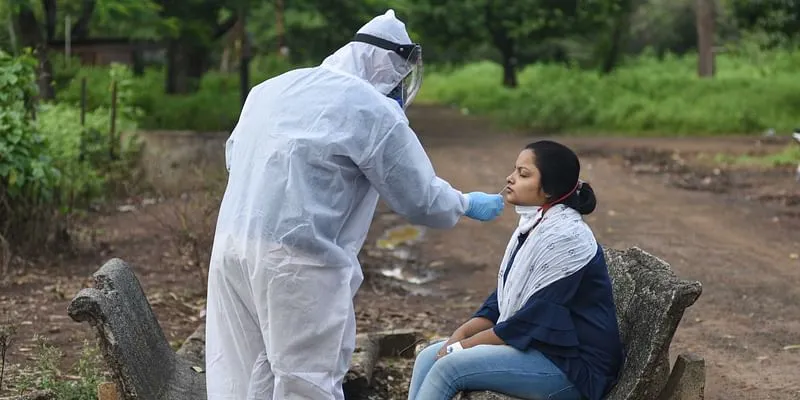
One of the members taking COVID-19 tests as a part of 'Ummeed'
The programme was backed by the National Health Mission (NHM), Maharashtra, which proved essential to its success. Cipla Foundation was Citi’s knowledge partner. Metropolis was chosen as the diagnostic partner basis their testing quality and strength of their distribution network in Maharashtra.
The stakeholders’ ability to track and analyse data real time through a newly developed dashboard ensured the programme was a success. “The access to real-time data meant tests that were assigned per agreed quota to municipal corporations could be reallocated to locations that needed it the most, based on on-ground realities, as medical directors across government hospitals and NHM, Maharashtra, were seeing the situation unfold,” Debasis shares.
Ummeed was conducted primarily in the state of Maharashtra. A total of 15 government hospitals and nine COVID-19 Care Centers located in 17 Municipal Corporations across nine districts in Maharashtra were identified based on Government diagnostic infrastructure and pattern of outbreaks.
You Nominate. We donate.
The employees of Citi wanted to be able to do more for the struggling population that was impacted by the pandemic. So, the company created a programme that asked its employees to nominate up to two families who would receive rations and hygiene products right at their doorsteps.
For the same, it designed a platform that was made available online and through smartphones for Citi employees to provide the names, addresses and landmarks of nominated families. This helped with data that would in turn be used to customise the packages in terms of dietary preferences and brands.
Each package consisted of 10 kg of rice, 10 kg of wheat flour, five kg of pulses, one kg of salt and two kg sugar, tea/coffee, toothpaste, bathing soap, feminine hygiene products and clothes washing soap. A bottle of floor cleaner, and three litres of cooking oil was also included. The delivery of these household essentials, sufficient for a family of four to five persons, for up to a month, also helped these families to 'stay at home’.
“Every bag, weighing 33 kilograms, carried the message in the Citi ‘blue’ in either English, Hindi, or three other regional languages: This is a small token of our appreciation for all that you do for us. Thank you,” says Debasis.
Nominated families included daily wage earners, such as auto-rickshaw drivers, sanitation workers, food delivery boys, tailors, electricians, migrant workers, part-time domestic helps, among others. Over 1,028 trucks delivered 850 tonnes of rations to 26,000 nominated families, benefiting between 104,000 to 130,000 individuals. On an average, 280 deliveries were made every day over 90-days.
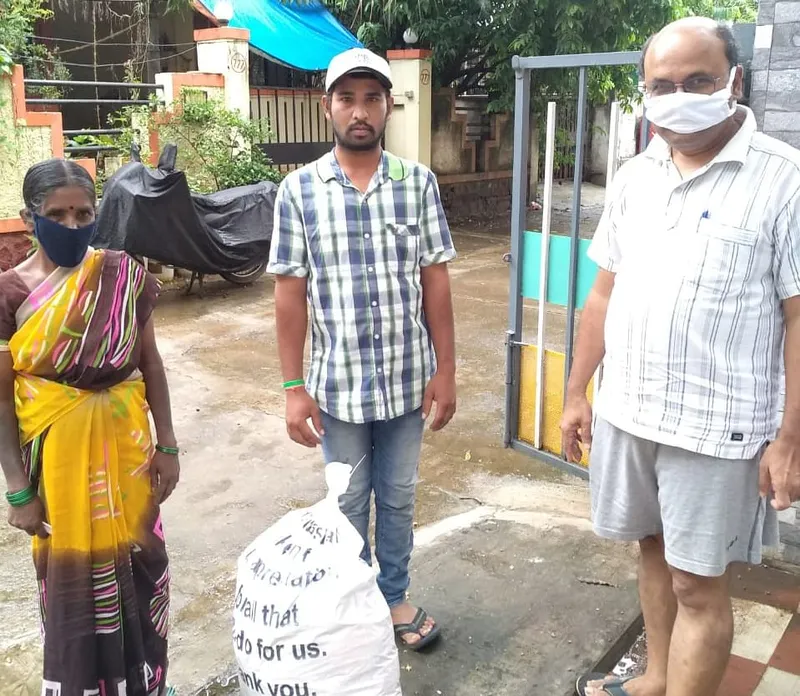
Suman, a house helper in Pune also received rations when she lost her means of livelihood.
The mobile app specially created for this programme tracked all door-step deliveries. The app stored all pre-confirmed addresses, landmarks, and phone numbers of nominees. To promote social distancing and keeping in mind literacy levels, ground support was able to use the app to take a picture of the family member receiving the rations, which was uploaded over the app and into the database to track deliveries and account for each package.
“A combined 200,000+ calls were made in Bengali, Kannada, Marathi, Tamil and Telugu, besides Hindi and English, to verify details at the start of the programme and at the time of door-step delivery,” Debasis shares.
The rations were distributed in many places across Hyderabad, Bengaluru, Delhi, Gurugram, Noida, Ghaziabad, Faridabad, Chennai, Pune, Mumbai, and Kolkata among others.
Pandurang Avghade, a daily wage earner, Mumbai, shares, “I was affected really badly by the pandemic, and it was impossible to look after my family of five including me. I was in duress, and then this happened. We were able to have a complete meal for a month with the groceries that were delivered at our doorstep. We thank Citi and the people who have managed this during these unprecedented times.”
Apart from these two programmes, Debasis says that Citi became the first corporate to significantly invest in India’s only deep-science incubator - Society for Innovation and Development (SID) at IISc, Bangalore, recognising the quality work that could potentially be utilised to bring India to a new normal amidst low-to-middle income citizens.
Through the non-profit Akshaya Patra Foundation, 1 million meals for daily wage earners were distributed nationally. Through St Jude ChildCare centres, 460 children ranging from the ages of two months to 15 years old, and their residing family members were supplied with masks, sanitisers, and dry fruit across nine cities.
Challenges and the way forward
Although these initiatives were launched with the right intention, they weren’t without challenges! From creating a dynamic form to accepting relevant data without duplications, from securing sufficient trucks and drivers to providing door-step deliveries amidst lockdowns and erupting hotspots to maintaining social distance - each step of ‘You Nominate. We Donate.’ had setbacks, according to Debasis. However, they were able to overcome the hurdles with the support of all their partners, and with the backing of a robust digital platform.
Detailing their plans for the road ahead, he adds, “Under Ummeed, an additional 35,000 tests are being planned for Maharashtra as per the need of the locations. Under ‘You Nominate. We Donate.’, Citi is evaluating providing rations for 75,000 additional families.”
Edited by Anju Narayanan


